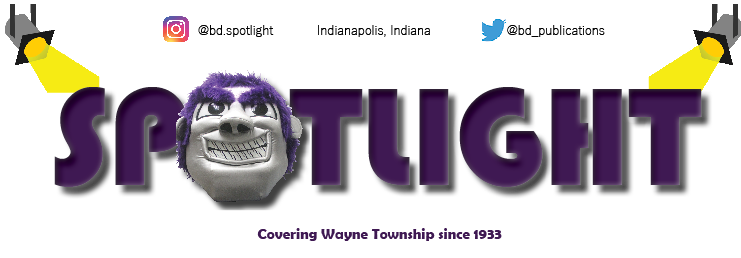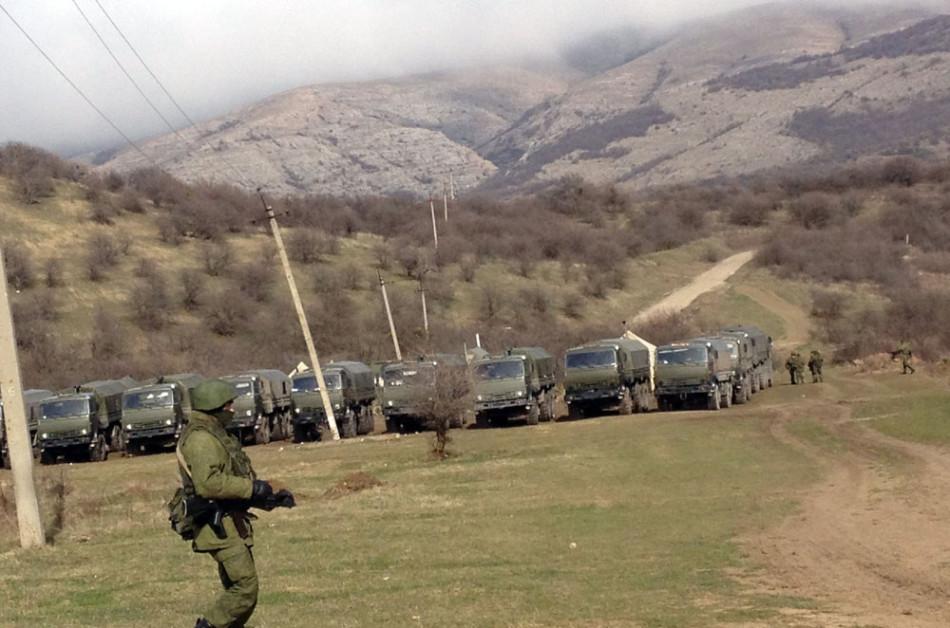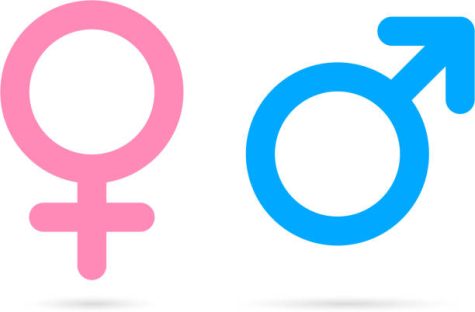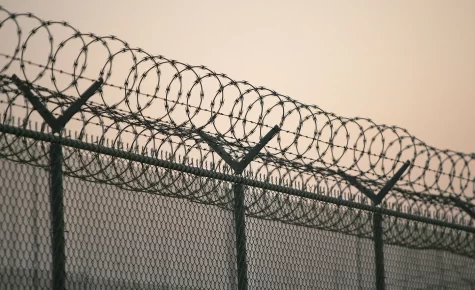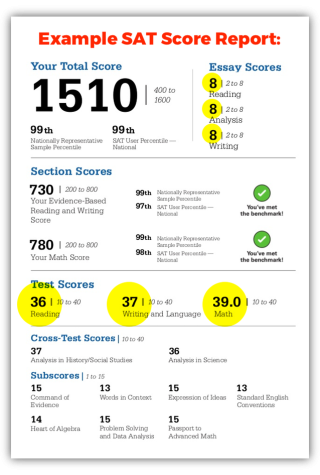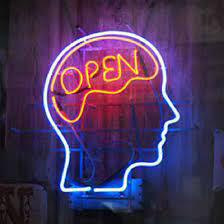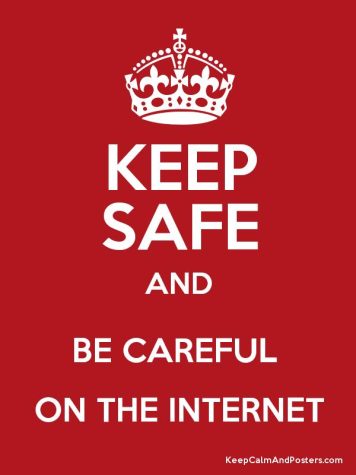Ukraine and America’s knowledge
Today’s students should pay attention
(Matthew Schofield/MCT)
The soldiers keeping Ukrainian forces in Perevalne penned inside their base bear no insignia and the trucks in the background have had the identifying license plates removed, but a Ukrainian captain who has dealt with them says that despite the political games, they freely admit they are Russians and occupiers.
March 11, 2014
The world is constantly in a state of change. If a country and its people weren’t constantly adjusting to new ideas, it would fall behind. This is evident in Ukraine.
Ukraine has a long history of wars with many different countries including Poland and Russia. Because of these wars, the countries involved already have built up tension from many years ago. Russia and Ukraine’s bitterness has always existed, but it peaked when Joseph Stalin became the leader of the Soviet Union
Under his control, millions of people starved to death and thousands of indigenous people were deported to other countries. Stalin also moved many Russians into the Crimean Peninsula, a crucial part of the present-day uprising.
The Crimean Peninsula has always been a rough spot for both Ukraine and Russia. Originally being part of Russia, it was a place that was constantly thrown around and dictated by Russian leaders. After Stalin’s decision to move Russian people into the peninsula, his successor, Nikita Khrushchev, decided to change ownership of the Crimean peninsula over to Ukraine. Many of the Crimean people disliked this decision.
After the Crimean peninsula transferred to Ukraine, a divide developed amongst the Ukrainian citizens. Some viewed themselves as Russian, and some viewed themselves as Ukrainian. This is where the current day struggles begin.
In the 2004 Ukrainian Election, Viktor Yanukovych — a Russian supporter — was elected president. Following this election, his rival candidate, Viktor Yushchenko — an European supporter — started a series of peaceful protests in the Ukrainian capital Kiev (called “The Orange Revolution”) calling for a re-run of the ballot.
In the following year, the re-run showed Yushchenko as the winner. This would ultimately prove to be a bad decision, considering in his four years of presidency the economy continued to decline, the Russian tension increased due to Yushchenko’s friendliness with Euro countries, and overall, it eventually lead to a further divided Ukraine. The opposite of what the people wanted.
Following Yushchenko’s election, Yanukovych ran in 2010 and won once again, but this time on fair terms. Because of this, Ukraine became close with Russia again. In November 2013, Yushchenko decided to sever all ties with European nations and rebuild Ukraine’s alliance with Russia. This is where our protests begin
In Kiev, thousands of people gathered to protest this decisions. This gathering started out peaceful, mirroring the Orange Revolution from 2004, but quickly grew into something bigger. Protests took to the streets, and fought to free their country from Russian ties once again.
These protests continued until the middle of February, when the protests successfully overthrew Yanukovych’s government regime. After this, the Ukrainian people instilled a temporary government that could control until the next elections.
Shortly after the government came into power, Russia invaded the Crimean peninsula. This Russian decision has caused worldwide concern. But, Crimea has been working admittedly to work out their standing with Ukraine and Russia. Crimea has already established its importance and alliances with Ukraine plenty of times over the past week.
This is where Ukraine currently stands on a worldwide level, but not in America.
Due to American media and news casting, students are uninformed on this topic. It is nearly impossible to find a completely unbiased news source, and our schools aren’t commenting on the subject. Without a reliable news source, and without an emphasis on current events in school, students are left in the dark on these topics.
The internet has quickly become a place for world news, but not many students take the time to research world news. It doesn’t get far on twitter, and it doesn’t reach their facebook feed. As a nation, we should work harder to inform our students about these topics
As a nation, we should work harder to inform our students about current events. Our children will be reading about these events in their history classes, so why shouldn’t we learn about them too?
The structure of schooling puts too much emphasis on the past, and overlooks important current events like the Venezuelan protests, the Syrian protests that are developing into a civil war, et cetera. There are plenty of crucial current events that are overlooked in schools, and this is leading to an apathetic and culturally uninformed generation.
During the Cold War, students were informed about the chance of war. There were drills in place so they could be prepared in the event of a bombing. That situation isn’t much different from this one. The only difference is that this doesn’t have an immediate effect on us.
This Ukrainian dispute has a lot of the world’s attention. The same as North Korea did last year when they threatened a missile launch, the same as the United States during the Occupy Movement in 2011, a peaceful protest which inspired many other nations to fight their governments. It is obvious that countries benefit from having informed citizens, and this is proven by the Occupy Movement.
In 2011, thousands of people marched in New York to fight the divide between the rich and the power, and it caught the nation’s attention. This is because we were aware of what was happening. There were constant live streams and bloggers commented on everything that happened. It became something that influenced other revolutions across the world.
These events will be in text books, and these events will become important parts of history all across the world. We often forget that people are actually going through these events, and it isn’t just something we are reading about.
“Courses seem disconnected,” English teacher Bobby Chin said.
Chin has recently been incorporating articles that focus on Ukraine into his English 10H course for the benefit of his students.
“From a young person’s perspective, it has hard to connect with wars that happened 50 years ago. It is important to learn about things that are happening now,” Chin said.
As students, we always read textbooks about wars that happened years and years ago and it seems like a distant memory.
That is a giant flaw in our text books. We view movements and wars as statistics and numbers, instead of people and deaths. We never truly view these events as important lessons, and just view them as facts that need to be memorized for a test.
Students need to be informed on these current day topics, or else they will begin to view the world as we see it on TV — an unhonest and distorted story being told by a reporter.
